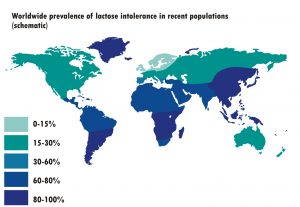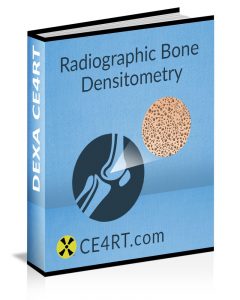Good Nutrition for Healthy Bones in Adults

A diet that is considered appropriate for optimal bone health is also recommended for overall good health and the prevention of chronic diseases. Thus, healthcare providers have an opportunity, at every patient encounter, to provide counseling with regards to good nutrition for healthy bones. This nutritional counseling is vital to prevent many common “lifestyle” diseases such as obesity, hypertension, and diabetes. Therefore, healthcare professionals should not miss this excellent opportunity to reinforce the importance of a healthy balanced diet in terms of both overall health and bone health.
Calcium for Healthy Bones
The recommended intake of calcium during early adulthood and middle age is 1000 mg every day. Healthcare professionals can quickly estimate a patient’s daily intake of calcium with a simple formula. A diet minus any dairy products typically contains 250 to 300 mg of calcium. A reasonable estimate of the patient’s total calcium consumption can thus be made by adding the calcium obtained from dairy products, fortified foods and beverages, and supplements to this baseline amount of 250-300 mg. Providers should also educate patients on how to quickly calculate their own calcium consumption. This should be part of counseling on good nutrition for healthy bones .
An additional advantage of obtaining calcium from common food sources is that they contain other essential nutrients as well. The most significant dietary sources of calcium are dairy products, canned fish with bones, and calcium-set tofu (tofu that is set with calcium sulfate as the coagulant). Fortified foods and beverages such as cereals and orange juice are also good sources of calcium.
Healthy Bones in Individuals with Lactose Intolerance
Some individuals have lactose intolerance and cannot consume dairy products. Health providers should guide such people on the importance of obtaining calcium from other dietary sources such as live culture yogurt, lactose-reduced milk and tofu, fortified soy beverages, and hard cheeses which are somewhat easier to digest.

Oxalate-Containing Foods and Bone Health
It is well known that oxalate impairs the absorption of calcium. Therefore, health providers should educate their patients about consuming low-oxalate vegetables such as kale, broccoli, mustard greens, and turnip greens to maximize calcium nutrition. Vegans and vegetarians should be informed to check food labels and identify high-calcium foods such as calcium-set tofu, calcium-rich vegetables, almonds, and calcium-fortified foods and beverages like soy products and orange juice. Fortunately, obtaining adequate amounts of calcium from the diet is becoming easier with an ever-expanding array of calcium-fortified foods available on supermarket shelves. However, most adults still need guidance on good nutrition for healthy bones.
Estimating Calcium Consumption
Healthcare professionals should teach patients to estimate their calcium consumption from diet. Food labels typically express the calcium content as a percentage of the recommended daily amount, which is 1000 mg for adults. Thus, a food item that contains 20 percent of the recommended daily amount has 200 mg of elemental calcium. In addition, patients can be guided to the USDA’s National Nutrient Database website which provides information on the calcium content of common foods including fresh vegetables and fruits.
Calcium Supplementation
For individuals who are unable to meet the recommended daily amount of calcium through diet alone, supplements are a vital source of this essential nutrient. They play an important role in good nutrition for healthy bones. As long as there is no gastrointestinal disease present, all the major types of calcium supplements are equally well absorbed when consumed with meals.
In individuals with gastrointestinal diseases or decreased production of stomach acid, calcium citrate salts are recommended as they are absorbed more readily. Different types and brands of calcium supplements contain varying amounts of elemental calcium. Healthcare providers should encourage patients to check the label of their supplement to determine the exact amount of calcium contained in each tablet and accordingly adjust the dose to achieve the target. In addition, patients should be encouraged to ensure that the supplement they are taking meets the lead content standards outlined by the United States Pharmacopoeia.
Combination Supplements
Some supplements are a combination of calcium and other nutrients like vitamin D and vitamin K. It is especially important to discuss this with individuals who are on warfarin anticoagulant (a blood thinning drug). The reason is that a high intake of vitamin K can alter response to warfarin therapy. Also, patients should be advised to ingest calcium supplements at least 4 hours away from thyroid medications and iron supplements because calcium is known to decrease the absorption of these drugs.
Calcium Absorption
Good nutrition for healthy bones does not simply involve eating well and taking supplements. Taking them correctly is important. Studies have shown that calcium is absorbed best when supplements are ingested at doses of 500 mg or less. Therefore, the daily intake of calcium from food and supplements should not be consumed in one large dose or at one meal but spread out into smaller amounts throughout the day.
Excess Calcium Intake
Finally, in addition to advising patients on the adequate intake of calcium, it is also important for healthcare providers to educate patients about the dangers of consuming too much calcium. According to the Institute of Medicine, 2500 mg daily is the maximum amount of calcium that can be tolerated by the body. However, it is noteworthy that some susceptible individuals can develop hypercalciuria (excessive excretion of calcium in the urine) even with a calcium intake of 1500 mg per day. This should also be part of the guidance on good nutrition for healthy bones.
Health professionals should inquire about antacid consumption. Many patients are unaware that antacids usually contain large amounts of calcium. For this reason, patients who regularly take large doses of antacids may be consuming calcium at levels above the upper tolerable level.
Dietary Vitamin D for Healthy Bones
As noted before, vitamin D is an essential component of good nutrition for healthy bones. It is needed for adequate mineralization of bones. It is noteworthy, however, that the recommendation for dietary intake of vitamin D in adults does not take into account the vitamin D made by the skin on exposure to the sun. In part, this is because it is difficult to determine the amount of vitamin D an individual is getting from exposure to sunshine.
The recommendation is for adults to consume 200 IU of vitamin D every day. However, up to 1,000 IU of vitamin D daily can be safely taken by adults. Higher intake than 1000 IU/day may be toxic in healthy individuals. However, physicians often prescribe larger doses to individuals with an established diagnosis of vitamin D deficiency. Food sources of vitamin D are limited. Approximately 100 IU of vitamin D is present in each cup of fortified milk and 25 IU in each egg yolk. Fish oils and fortified cereals are additional sources.
Vitamin D from Sunlight Exposure
The amount of active vitamin D circulating in the body depends on sunlight exposure and dietary intake. Vitamin D levels also vary with age, race, geography (latitude), and clothing habits. Vitamin D production is stimulated by ultraviolet B radiation. The use of sunscreen above SPF-8 blocks ultraviolet B rays and can lead to a deficiency of vitamin D, although the extent to which this occurs has not been well established. In recent times, vitamin D deficiency has been recognized as a frequent problem in older individuals and in people living at northern latitudes. This must be kept in mind when counseling patients on good nutrition for healthy bones.
Vitamin D Deficiency Diagnosis and Treatment
It is the responsibility of health providers to educate their patients about obtaining adequate amounts of vitamin D from dietary sources, supplements, and sun exposure. In addition, physicians should consider certain high-risk individuals for measurement of circulating 25-hydroxy vitamin D in the blood. These high-risk individuals include people with suboptimal nutrition and low dietary intake of vitamin D, people with very limited sun exposure, and people with gastrointestinal disorders that can potentially lead to inadequate absorption of the vitamin. If vitamin D deficiency is definitively established, then physicians should prescribe vitamin D at pharmacologic doses to replenish stores in the body and ensure adequate mineralization of bone.
Proteins for Bone Health
The effect of dietary protein on the bone health of adults is not completely understood. However, the role of this important nutrient in good nutrition for healthy bones is well understood. It is known that a balanced diet with adequate amounts of protein is important for bone health. It has also been noted that protein supplementation following a hip fracture is associated with better healing and a reduced mortality rate. In addition, studies have shown that low dietary protein leads to decreased calcium absorption. On the other hand, however, high dietary protein can lead to hypercalciuria (increased urinary excretion of calcium).
Sources of Dietary Protein
In general, consuming protein according to dietary recommendations does not cause any problems with calcium metabolism or bone health. The primary dietary sources of protein are meat and poultry, some vegetables such as beans, and dairy products. The recommendations are for adults to consume 2-3 servings of dairy (milk and cheese) and 2-3 servings of other protein-containing foods (meat, poultry, beans) daily to obtain adequate amounts of protein according to current guidelines. However, individuals who are recovering from a fracture or have previously had inadequate protein intake may require higher consumption to bring protein levels back to normal. It should be noted, however, that this increased intake of protein should be undertaken in conjunction with a sufficient intake of calcium. These guidelines must be explained during counseling on good nutrition for healthy bones.
Healthy Foods for Healthy Bones
Low-fat dairy is a good source of protein, calcium, phosphorus, and many other essential nutrients. Many vegetables contain small amounts of protein and are also an excellent source of fiber and essential minerals. Soy proteins such as soya bean, tempeh, and full-fat tofu contain compounds called isoflavones. Short-term clinical trials have demonstrated that these plant compounds, isoflavones, have estrogenic effects and can increase bone density. For individuals who cannot obtain adequate protein from food sources, supplements are available to ensure adequate nutrition. These foods and supplements can promote good nutrition for healthy bones.
Salt and Bone Health
There are several other micronutrients present in food that influence bone health in adults. For example, an increased intake of sodium chloride (salt) leads to an increased excretion of calcium in the urine. For this reason, excessive salt intake has been linked to increased bone resorption in postmenopausal women, although this effect of dietary salt can be offset by ensuring adequate calcium consumption. The Institute of Medicine recommends limiting salt intake to 2,400 mg of sodium per day. Limiting salt is an important component of good nutrition for healthy bones. Consuming fresh, unprocessed food is beneficial not only for bone health but also to remain within the recommended limit of sodium intake that is necessary for overall good health.

Healthcare professionals should guide their patients on ways to reduce dietary salt. This includes directing individuals to avoid canned, cured, and processed foods. Home cooking and consumption of fresh fruits and vegetables should be encouraged. In addition, health providers should educate their patients about checking food labels, especially when buying processed foods. When eating outside the home, choosing fresh salads without dressings and meats without sauces should be advocated.
Caffeine and Bone Health
Caffeine is known to decrease calcium absorption to a small degree. However, both caffeinated and non-caffeinated sodas (carbonated beverages) do not significantly affect the excretion of calcium. Studies have shown that as long as an individual consumes adequate amounts of calcium, it is safe to consume carbonated beverages in moderation.
Other Essential Nutrients for Bone Health
Other essential minerals such as phosphorus, copper, magnesium, and boron also affect bones to varying degrees. Since these nutrients are required in very small quantities, they can generally be obtained by consuming an overall balanced and healthy diet. Good nutrition for healthy bones consists of lean proteins, fresh fruits and vegetables, and foods containing calcium and vitamin D. It also includes limiting consumption of salt and caffeine to moderate amounts.
Earn ARRT® CE Credits
We offer a range of continuing education courses for X-ray techs. To earn 23 CE credits, purchase our course on bone densitometry, which is also good for general radiography. Our range of e-courses gives you the flexibility to choose the type and number of credits you need.
Here is details about x ray continuing education credits
